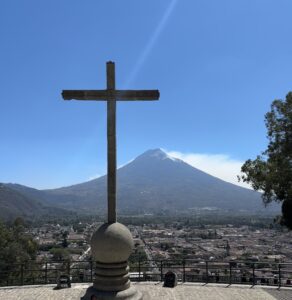by Mary | Mar 11, 2009 | Uncategorized
From my post at OSV Daily Take today:
Cardinal Edward Egan, outgoing Archbishop of New York, said today that priestly celibacy is not a closed issue and is “a perfectly legitimate discussion.”
“I think it’s going to be looked at, and I am not so sure it wouldn’t be a good idea to decide on the basis of geography and culture not to make an across-the-board determination,”…continue reading.
by Mary | Mar 10, 2009 | family, Lent
Sometimes, when I’m yelling at my children for yelling at each other, I realize how ridiculous I must sound. Surely even my 3-year-old must be wondering why it’s OK for mommy to yell, but it’s not OK for her to yell. Same thing with the whole tone-of-voice debate. Did you have to answer your sister that way? Can’t you speak to your brother in a nice tone of voice? Do you talk to your teacher that way? Well, guess what? I’m pretty sure they didn’t conjure up that annoying tone of voice out of nowhere. They are like sponges, soaking up everything — good or bad — from what they see and hear around them. I hate it when I realize that part of what they’re soaking up are my own bad habits.
I think that’s why today’s Gospel makes me so uncomfortable. Jesus points to the Scribes and Pharisees and says, “For they preach but they do not practice.” Gulp. I don’t need a Scripture scholar to tell me that this line isn’t just about the Jewish leaders of Jesus’ time. When I take the time to reflect on what I try to teach my children about the way they should talk, the way they should act, the way they should strive to live, I have to admit that I may be doing a whole lot of preaching, but practicing? Not so much. Which is too bad because, as they say, actions speak louder than words.
The Little Black Book that I’m using for some of my Lenten reflections says that the way to avoid being a hypocrite is to “acknowledge our own flaws” because it is only when we are willing to face our own sinfulness head on that we are able to help others move beyond the sinfulness that holds them down.
And nowhere is that more obvious than right here at home, as we struggle to get the kids out the door each morning, or settled down for homework each afternoon, or bathed and into bed at a reasonable hour each night. Those are daily opportunities to be Jesus to my children, to practice what I preach.
It would be easy to look at the big picture and pat myself on the back for my general behavior out in the world each day, but can I say the same thing about my behavior among my family each day? Ah, there’s the rub. Sometimes it’s easier to love a stranger in a far-off land than it is to love the people living alongside us. The stranger doesn’t give us that tone of voice or death stare. The stranger doesn’t talk back or mess up the house. The stranger can be kept at arm’s length. Jesus doesn’t invite us to love at a distance. He invites us to love as we want to be loved. Easy to preach, pretty to quote, difficult to live.
by Mary | Mar 8, 2009 | Lent
I’ve never found the Transfiguration to be easy or comforting. I wrote this column a few years back, but it still resonates with me today:
Jesus knew that when the frightening events surrounding his crucifixion began, his Apostles were going to need something to keep them going. So he gathered three of them – Peter, James and John – and took them to a high mountain where he was transfigured before their eyes. This dazzling moment was meant to offer them encouragement and comfort during the time when they would lose hope, and it is meant to do the same for each one of us as we journey through Lent and through the difficult times of our lives. Like a priceless photo we can turn to again and again, the Transfiguration stands out as one shining example – literally – of just how understanding and compassionate Jesus is.
But there’s something else in this story that I find even more comforting than the image of Jesus between Moses and Elijah: It is the image of the Apostles falling to the ground in fear despite the fact that they were part of Jesus’ inner circle. Throughout the Gospels, the Apostles never fail to remind us that the people Jesus handpicked to spread his Good News were often scared, missing in action or worse.
On the mountain of the Transfiguration, Peter was more concerned with erecting three tents for Jesus, Moses and Elijah than with digesting what the event really meant. He later denies that he even knows Jesus. He is absent from the foot of the cross and boarded up in a small room with the others when Mary Magdalene comes to proclaim that she has seen the risen Christ. Peter alone should provide each one of us with the comforting realization that if he can become The Rock, then surely we can become at the very least pebbles worthy of getting caught in the Master’s sandals.
Jesus took these three Apostles up Mount Tabor, knowing that they would need something pretty spectacular to shore them up when the times got tough. God spoke from above, “This is my beloved Son, with whom I am well pleased; listen to him.” It doesn’t really get more spectacular than that – not until Easter Sunday, that is.
I have to admit that I had never really given much thought to the Transfiguration as an image designed to give me strength. I have listened to the Transfiguration account year after year, believing that its significance was something beyond my comprehension. It’s too mystical for me, I thought. That was until recently, when I sat down with this Gospel reading – away from Church, away from homilies, away from enthusiastic children trying to climb out of my lap and into the next pew.
That’s when it hit me: Jesus is at once transfigured and transfiguring. Yes, he is God’s son revealed to us. Yes, he gives us an image we will never forget. But he does more than that. He reminds us that through the power of God’s all-merciful love each one of us can be transfigured here and now in our daily lives. We might not be able to dazzle like the sun, but our souls can radiate a spectacular spiritual light if we just open our hearts to Jesus and his transfiguring message of compassion and forgiveness.
Lent is under way. Perhaps we are struggling to keep our Lenten promises and sacrifices. Maybe we, too, have fallen in frustration or fear. If that is the case, we can reflect on the image of the Transfiguration, and listen to the words Jesus spoke to his Apostles when he reached out to them in their fear, “Rise, and do not be afraid.”
Copyright 2009, Mary DeTurris Poust
by Mary | Mar 6, 2009 | Uncategorized
Sometimes things happen that really catch me off guard, in a good way. I get a phone call or meet someone and think, yes, this is God’s hand at work in my life. I may not know why or how it will affect things down the road, but I have a clear sense that it’s all beyond anything I’m doing. That has happened several times this week, which makes it even more powerful. It’s like grace upon grace entering into my life.
First I came home from Denver, fired up by the people I met and the experience of spending so much time with so many Catholics. Several readers have asked what I was talking about when I was in Denver. Well, my presentation was on the “Lost Generation,” those adult Catholics who are disconnected from the faith and how we might reach out to them and welcome them into a loving community. Normally public speaking is really at the very bottom of my list of favorite things to do. I believe I ranked it right behind being buried alive in a previous post on the subject. But Denver was exactly where I needed to be last weekend. I knew that almost from the moment my plane landed. And although I was nervous, as usual, when my first workshop approached, I really did find a way to put it in God’s hands and allow whatever was meant to happen to unfold. The result was so good it startled me — so much so that I wasn’t even nervous the next day when it was time for my workshop. That, to me, was a revelation, a sign that if we are willing to open ourselves up to something, even something we might not really want to do, we often find ourselves exactly where we need to be.
This week has been more of the same. I came home to a pile of work and a bunch of interviews that needed to be done. All I can say is that those interviews, with four different Sisters of Saint Joseph who are retreat masters and spiritual directors, were more like spiritual experiences, not at all like work. I am lucky in that I rarely find my work to be a chore. A challenge, yes, but not a chore. It is too immersed in spirituality and God and faith to ever be really burdensome. As I sat and talked with the sisters about silence and prayer and just how powerful retreats can be in our “regular” lives once we return home, I had the distinct feeling that I was supposed to be learning a lesson, not just writing a story.
Fast forward to today. An unexpected phone call leading me in new directions — possibly. An email offering a spiritual lift. And, best of all, a package in the mail that both surprised and touched me. I saw something from Denver and assumed it was an official follow-up of some sort to my workshop. But it was not. It was a note from a Dominican novice who attended my second workshop and stayed after to talk to me. In the process of discussing various things, I happened to mention that I never got my copy of Magnificat’s Lenten Companion. I just said it in passing because we were talking about related things. Anyway, there in my mailbox was a copy of the Lenten Companion with a note thanking me for my presentation and for focusing attention on the Catechism of the Catholic Church. I realize that may not seem like a big deal, but for me it really is. Part of me was so nervous when I saw two Dominicans sitting out in my audience at my workshop (to be rivaled only by the presence of both an auxiliary bishop and the head of evangelization for the archdiocese at the previous day’s workshop). I spotted those Dominican habits and immediately thought: Great, Dominicans. After all, they’re preachers. Surely they’d be better standing up there. But I let that thought go and remembered that, for whatever reason, I was the one meant to be there that day. And by opening myself up to that possibility, that reality, I opened myself up to the graces that come with trusting in God’s plan. And now I feel those graces multiplying — in something as simple as a note from a novice.
by Mary | Mar 5, 2009 | Lent
From my post at OSV Daily Take:
This morning at breakfast I was lamenting the state of our world and, more specifically, the state of our country. As I read the seemingly endless stories about the seemingly endless bailouts, I told my husband that I no longer feel like I can honestly tell my children that if they work hard and treat people right, they will get ahead in this life. Continue reading…



